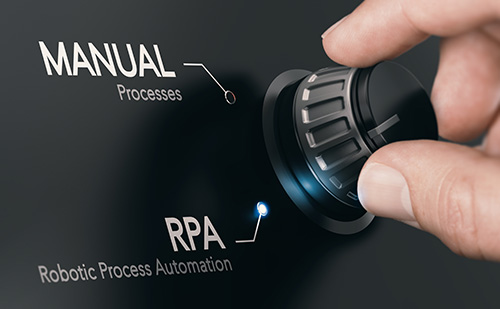What is Robotic Process Automation?
/in Automation /by Mosaic CorporationIt’s time to modernize your workflows and replace cumbersome paper processes, and Robotic Process Automation (RPA) is the solution for you.
In today’s digital landscape, businesses are turning to Robotic Process Automation (RPA) to optimize their operations and drive digital transformation. RPA is a rapidly growing technology set that eliminates manual labor associated with mundane tasks, streamlining daily operations and giving businesses an edge in data accuracy.
Read on to learn more about how Mosaic’s process automation software can help redefine how companies approach their business workflows and bring them into the 21st century!
Understanding Robotic Process Automation (RPA)
Robotic Process Automation (RPA) is a term that has been gaining popularity in recent years, especially in the world of business.
RPA is essentially a technology that uses software robots to automate tasks that are traditionally done by humans. These robots mimic the actions of human workers and can be programmed with machine learning capabilities to perform a variety of complex tasks, ranging from data entry to customer service.
The benefits of RPA are numerous, including increased efficiency, accuracy, and cost savings. Companies that have implemented RPA have seen significant improvements in their operations and can redeploy their human resources to more strategic tasks.
Understanding RPA is essential for any business looking to stay competitive and efficient in today’s fast-paced environment.
Unparallelled Cost-Saving from RPA
Robotic Process Automation (RPA) has become a game-changer for businesses aiming to save costs without sacrificing efficiency and accuracy.
By automating repetitive, high-volume tasks with RPA, companies can drastically reduce the time and resources needed to complete them. This leads to a faster turnaround time and increased productivity, which in turn results in significant cost savings.
But it’s not just about efficiency. RPA is also known for its accuracy, eliminating the margin of error caused by human error. Moreover, RPA can help ensure compliance as it follows pre-determined rules and regulations. So, if your business is looking for a way to save costs while improving efficiency, accuracy, and compliance, RPA is the way to go.
Read More: ROI For Going Paperless
Robotic Process Automation Use Cases
From streamlining accounts payable processes to automating sales order processing and even HR processes, RPA has proved to be a game-changer for businesses across different industries. Freight process automation has also gained traction as businesses seek to optimize their supply chain and logistics operations.
RPA has also revolutionized enterprise content management (ECM) solutions, enabling businesses to capture, process, and manage huge volumes of data with ease. Other innovative RPA applications include Intelligent Document Capture (IDC) solutions and ERP integration services that help businesses unlock the full potential of their IT systems.
1 AP Automation
Accounts payable (AP) processes can be tedious and time-consuming, especially for companies that process a high volume of invoices. With RPA technology, businesses can automate the entire accounts payable process, reducing the risk of human error and drastically improving efficiency and lowering the cost per invoice processing dramatically.
2 Sales Order Automation
The sales process is vital for any business, and workflow automation can be used to streamline the entire process. RPA can automate tasks such as data entry, customer service inquiries, and order processing, saving time and resources.
3 HR Automation
The human resources (HR) department is often bogged down by repetitive tasks, making it difficult to focus on more pressing matters. HR automation and RPA can lighten the load by automating administrative tasks such as payroll and employee onboarding.
4 Freight Process Automation
The freight process is complex and requires a great deal of planning. With RPA, businesses can automate the entire freight process, making it faster and easier to manage. Automation can also help with billing, tracking shipments, and optimizing routes.
5 ECM Solutions
Enterprise content management (ECM) solutions are used to store and manage digital documents. RPA can help automate the entire process, from document capture to storage and retrieval. Automating ECM processes helps ensure compliance with industry regulations while also improving efficiency.
6 IDC Solutions
Identity and access management (IDC) solutions are necessary for any company that needs to protect its data. RPA automation can help with security audits and compliance, as well as user provisioning and verification processes.
7 ERP Integration Services
ERP integration services are essential for businesses that need to manage their data and ensure its accuracy. RPA can be used to automate the entire process, from data entry to report generation. This helps businesses stay organized and reduces the risk of errors.
In a nutshell, RPA use cases are endless, and the technology is set to continue transforming the way businesses operate.
Start Your Digital Transformation Journey Today!
In today’s rapidly evolving business landscape, there’s no denying that digital transformation is crucial for success. As we discussed, a key tool in this process is Robotic Process Automation (RPA), which can streamline repetitive manual tasks and free up employee time for higher-value work. By implementing RPA, businesses can become more efficient, reduce costs, and improve the overall customer experience.
If you’re interested in learning more about RPA and how it can benefit your organization, don’t hesitate to talk to the experts at Mosaic. We can help you assess your needs and develop a customized strategy to take your digital transformation to the next level. Contact Us Today to optimize your business operations and stay ahead of the competition!
Want to learn more? We wrote a comprehensive guide on Understanding Digital Transformation: Definition, Benefits, and Opportunities.




